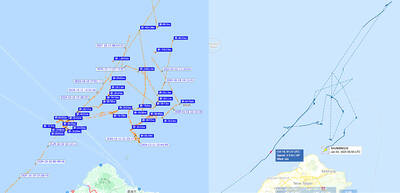The nation’s top cross-strait negotiator yesterday remained evasive about whether he would request compensation and ask his Chinese counterpart to apologize to the Taiwanese public for the contaminated milk powder scandal and request compensation.
Straits Exchange Foundation (SEF) Chairman Chiang Pin-kung (江丙坤) said yesterday that the foundation would definitely “communicate” with Beijing if the Mainland Affairs Council (MAC) asked the foundation to seek an apology from China over the tainted milk scandal.
When asked whether he would ask his Chinese counterpart — Association for Relations Across the Taiwan Strait (ARATS) Chairman Chen Yunlin (陳雲林) — to apologize or bring up the issue of compensation when he visits Taiwan later this month or early next month, Chiang said he would “exchange views with Chen on issues placed on the agenda.”
Chiang said the administration’s policy has always been to address trade problems through the communication channel between SEF and ARATS.
Chiang said that talks on sea and transportation links would be on the agenda, adding that once such links are established, it would save not only time but also money.
It will also boost the competitiveness of Taiwanese products and make travel more convenient for people on both sides of the Strait, Chiang said, adding that he believed Taiwanese would support the normalization of cross-strait trade.
Asked about the effectiveness of sending a delegation of food safety experts and officials to Beijing to deal with the tainted milk powder issue, Chiang said the delegation, which returned on Monday, had fulfilled its mission.
Both sides have agreed to set up a direct communication channel and promised to cooperate on food inspection, Chiang said, adding that he believed the delegation had “made certain demands” during their trip to China.
Chiang remained tight-lipped yesterday about the exact date for Chen’s visit, saying both sides have to “closely cooperate” on the matter.

DEEPER REVIEW: After receiving 19 hospital reports of suspected food poisoning, the Taipei Department of Health applied for an epidemiological investigation A buffet restaurant in Taipei’s Xinyi District (信義) is to be fined NT$3 million (US$91,233) after it remained opened despite an order to suspend operations following reports that 32 people had been treated for suspected food poisoning, the Taipei Department of Health said yesterday. The health department said it on Tuesday received reports from hospitals of people who had suspected food poisoning symptoms, including nausea, vomiting, stomach pain and diarrhea, after they ate at an INPARADISE (饗饗) branch in Breeze Xinyi on Sunday and Monday. As more than six people who ate at the restaurant sought medical treatment, the department ordered the

A strong continental cold air mass and abundant moisture bringing snow to mountains 3,000m and higher over the past few days are a reminder that more than 60 years ago Taiwan had an outdoor ski resort that gradually disappeared in part due to climate change. On Oct. 24, 2021, the National Development Council posted a series of photographs on Facebook recounting the days when Taiwan had a ski resort on Hehuanshan (合歡山) in Nantou County. More than 60 years ago, when developing a branch of the Central Cross-Island Highway, the government discovered that Hehuanshan, with an elevation of more than 3,100m,

Taiwan’s population last year shrank further and births continued to decline to a yearly low, the Ministry of the Interior announced today. The ministry published the 2024 population demographics statistics, highlighting record lows in births and bringing attention to Taiwan’s aging population. The nation’s population last year stood at 23,400,220, a decrease of 20,222 individuals compared to 2023. Last year, there were 134,856 births, representing a crude birth rate of 5.76 per 1,000 people, a slight decline from 2023’s 135,571 births and 5.81 crude birth rate. This decrease of 715 births resulted in a new record low per the ministry’s data. Since 2016, which saw

SECURITY: To protect the nation’s Internet cables, the navy should use buoys marking waters within 50m of them as a restricted zone, a former navy squadron commander said A Chinese cargo ship repeatedly intruded into Taiwan’s contiguous and sovereign waters for three months before allegedly damaging an undersea Internet cable off Kaohsiung, a Liberty Times (sister paper of the Taipei Times) investigation revealed. Using publicly available information, the Liberty Times was able to reconstruct the Shunxing-39’s movements near Taiwan since Double Ten National Day last year. Taiwanese officials did not respond to the freighter’s intrusions until Friday last week, when the ship, registered in Cameroon and Tanzania, turned off its automatic identification system shortly before damage was inflicted to a key cable linking Taiwan to the rest of